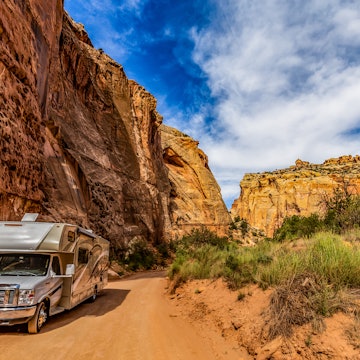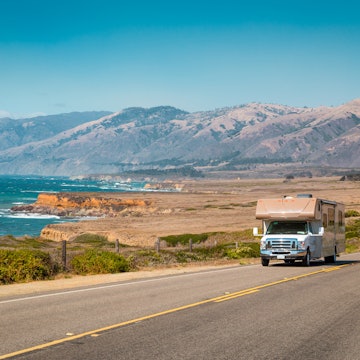

See the world beyond Sin City on these top day trips from Las Vegas. Matt Munro/Lonely Planet
What happens in Vegas stays in Vegas, so they say, but there's no need to stay inside the city limits on a trip to the casino city. Beyond the crowds and bright lights of Las Vegas lies the uplifting emptiness of the Mojave Desert – the gateway to some of Nevada's most dynamic landscapes.
People who enjoy wild and lonely places will love driving the scenic and remote back roads that radiate out from Las Vegas, following routes made famous by rock-and-roll singers and Hunter S Thompson. Few cities in America will put you within day-tripping range of so many iconic American sights.
So enjoy your fill of the roulette tables, bars and restaurants downtown, then hop in the car to experience the best of Nevada and beyond on these thrilling day trips from Las Vegas.

1. Grand Canyon
Travel Time: 4 hours 30 minutes
No matter how much you read about the Grand Canyon or how many photographs you've seen of its plunging depths, nothing really prepares you for seeing America's most famous natural wonder in the flesh. It's so startlingly familiar and iconic you can't take your eyes off it.
The canyon's immense size, the sheer intensity of the light and shadows at sunrise or sunset and the tremendous natural forces that caused it to come into existence make this a place to explore slowly. Don't rush the experience by trying to squeeze everything into a single day. You can reach the South Rim of the Grand Canyon in less than five hours, so stay a couple of days and immerse yourself in its grandeur.
How to get to the Grand Canyon: If you really can only spend a day, you'll need an early start to make it back the same night. If possible, spread the trip over several days to see the canyon from multiple angles.
For a day trip from Vegas, the closest section of the canyon is Grand Canyon West, with its famous Skywalk, administered by the Hualapai nation. It's a 2½-hour drive via US Highway 93, and a shuttle bus will ferry you to the viewpoints from the car park.
Allow 4½ hours to reach the South Rim from Las Vegas, following sections of US Highway 93, Route 66 and Arizona State Route 64. There are places to stay both inside and outside Grand Canyon National Park.

2. Red Rock Canyon
Travel Time: 20–30 minutes
The dramatic vistas of Red Rock Canyon Conservation Area are revered by Las Vegas locals and adored by visitors from around the world. Thurst upwards by extreme tectonic forces, the 3000ft-high red sandstone escarpment that rises from the valley floor was once a section of ancient seabed some 65 million years ago.
A scenic 13-mile drive from Las Vegas serves up mesmerizing views of the canyon's most striking features, with numerous hiking trails and rock-climbing areas radiating out from roadside parking areas. For more information on the legendary climbs here, check out the resources on the Mountain Project website.
How to get to Red Rock Canyon: The canyon is about 13 miles from the central Strip along Nevada State Route 159 – a 20-minute drive. The conservation area begins about three miles from the Vegas suburb of Summerlin.

3. Valley of Fire State Park
Travel Time: 1 hour
Dedicated in 1935, Valley of Fire State Park was Nevada's first state park, and its psychedelic landscape of surreally striped rocks was carved by wind and water over thousands of years. Make the visitor center your first port of call to find out how best to tackle this masterpiece of southwest desert scenery. Within the park boundaries are 40,000 acres of red Aztec sandstone, petrified trees and ancient Native American petroglyphs at Atlatl Rock, accessible via hiking and driving trails, but don't undertake any hike without plenty of water.
Must-see spots within the valley include the dramatic natural landscapes of White Domes, Rainbow Vista, Fire Canyon and Silica Dome – each as magnificent as it sounds. To learn more about the unique geological features of the park, the visitor center sells guidebooks and maps and takes reservations for guided hikes and ranger-led stargazing expeditions. If you're there for more than a day, try your luck at securing one of the 72 first-come, first-served primitive campsites.
How to get to Valley of Fire State Park: The Valley of Fire State Park visitor center is about 50 miles northeast of Downtown Las Vegas, signposted off Interstate 15. Drive time is under one hour.

4. Lake Mead
Travel Time: 45 minutes
Created when a whole valley system was flooded by the Hoover Dam in 1936, the Lake Mead National Recreation Area is a popular boating, swimming and camping destination for Vegas residents. For tourists, a trip here is often tied together with a visit to the nearby Hoover Dam.
The lake lies within a protected area spanning a broad sweep of the unbearably dry Mojave Desert, stretching for 110 miles toward the Grand Canyon. Also here is 67-mile-long Lake Mohave, which runs along the Arizona border, alongside endless miles of spectacular desert scenery to explore on driving routes and a handful of hiking trails.
While most visitors come to Lake Mead to enjoy the water, don't overlook the hiking here. At Grapevine Canyon near Lake Mohave, a quarter-mile jaunt takes you to a panel of petroglyphs dating back as far as the 11th century CE, and you can boulder-hop further up the gorge, which encloses a ribbon-like stream trickling down from a spring.
Longer routes include a 3.7-mile hike through five tunnels following the former railway line that once linked the site of the Lake Mead Visitor Center to the Hoover Dam. The most challenging hike in the park is a three-mile, 800ft descent to a series of hot springs set in a slot canyon off Black Canyon. The area can get extremely hot in summer and hiking is not recommended from May to September.
How to get to Lake Mead: The most visited northern section of Lake Mead is less than an hour’s drive from Las Vegas along Lake Mead Blvd, while the southern shores can be reached via US Highway 93.
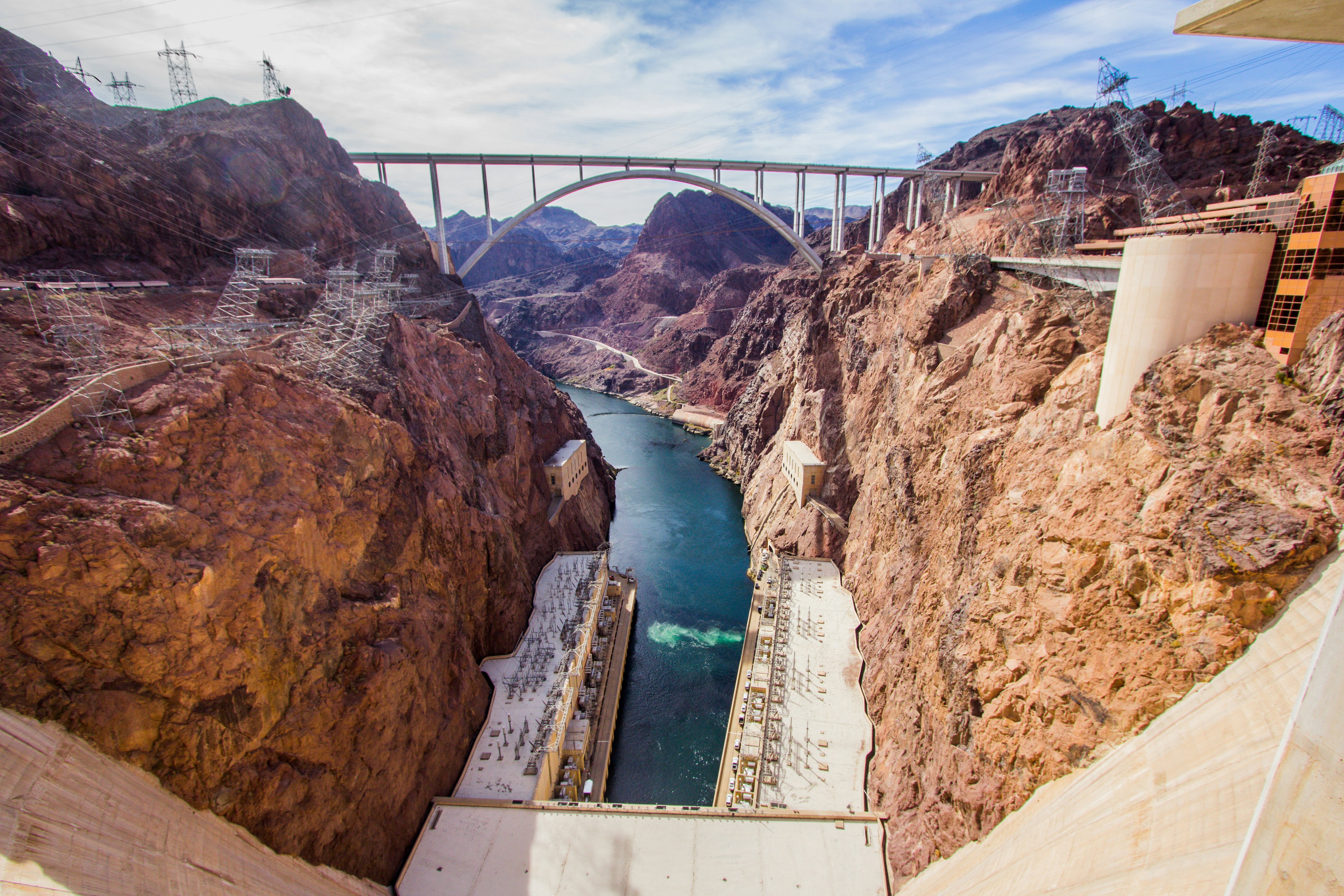
5. Hoover Dam
Travel Time: 1 hour
Day-trippers often visit Hoover Dam and Lake Mead together on the same trip, which makes sense as the lake was created during the construction of the dam in the 1930s. At the height of the Depression, thousands of men and their families migrated here and worked in excruciatingly hot conditions, dangling hundreds of feet above Black Canyon to build this massive 726ft-high arch-gravity dam, completed ahead of schedule and under budget in 1936.
It came at a cost. Ninety-six workers lost their lives building this iconic art deco structure, which has come to define this stark but eye-catching section of the desert. Tours of the dam begin at the Hoover Dam Parking Garage & Visitor Center, and tickets can be booked ahead online.
How to get to Hoover Dam: The Hoover Dam visitor center is a one-hour drive from central Las Vegas along US Highway 93 and Nevada State Route 172. The dam is open from 9am to 5pm, but the last tour of the day leaves at 3:45pm.

6. Spring Mountains
Travel Time: 1 hour 20 minutes
To the west of Las Vegas, the limestone cliffs and forested peaks of the Spring Mountains rise dramatically above the Mojave Desert. This mountainous area is a playground for hiking, mountain biking, camping, horseback riding, rock climbing and other outdoor activities.
Start your explorations in the Spring Mountains National Recreation Area section of Humboldt-Toiyabe National Forest, where a modern, state-of-the-art interpretive center features educational dioramas, exhibits and artworks. Park rangers are on hand to steer you toward your perfect forest experience.
How to get to the Spring Mountains: The drive from Vegas takes around one hour and 20 minutes, following US Hwy 95 then Nevada State Route 157.
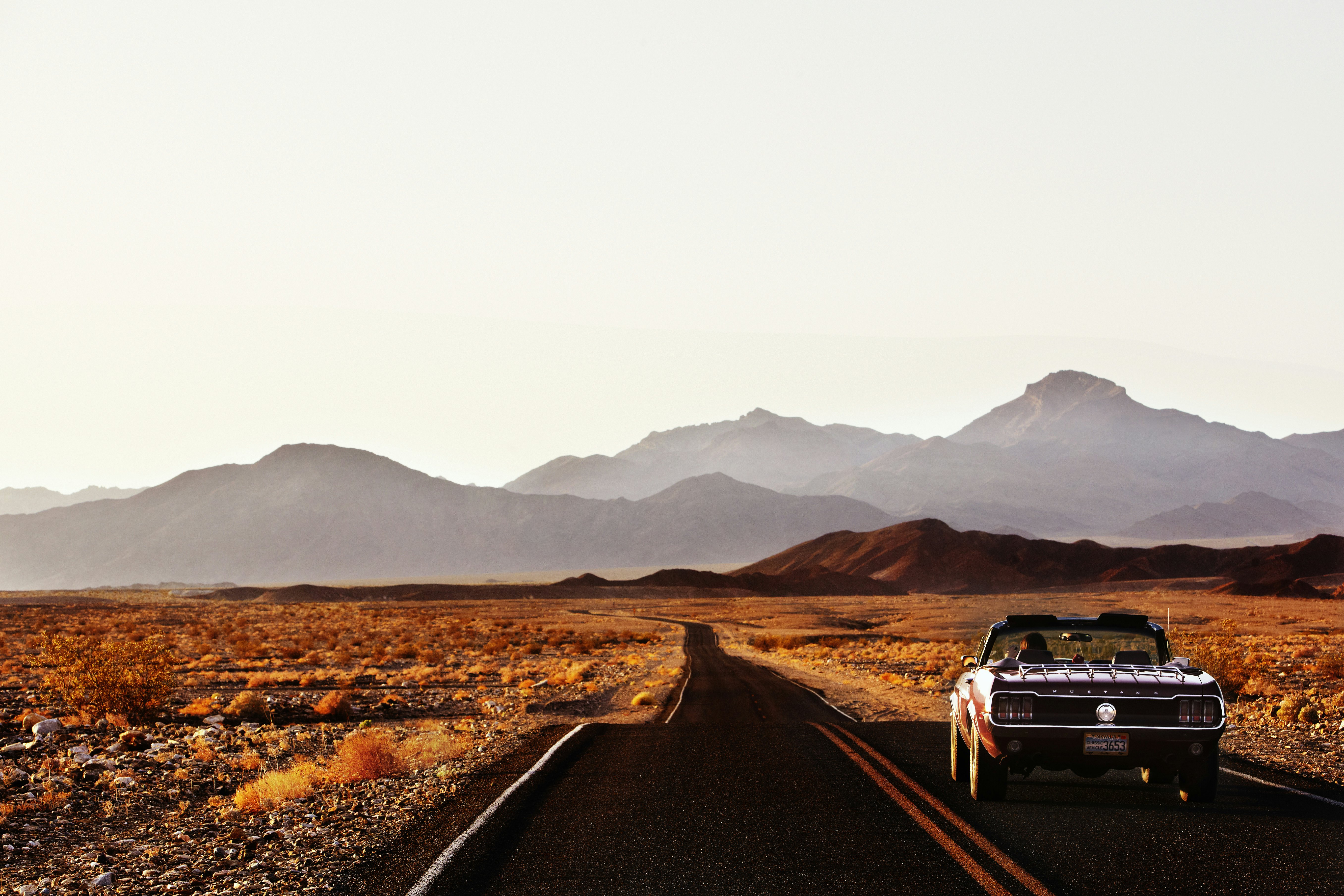
7. Death Valley
Travel Time: 2 hours
The name Death Valley evokes visions of somewhere harsh, hot and hellish – a punishing, barren and lifeless place of Old Testament severity. But closer inspection reveals nature putting on a truly spectacular show. Around this low-lying basin, you'll find singing sand dunes, water-sculpted canyons, extinct volcanic craters, palm-shaded oases, stark mountains rising to 11,000ft and boulders that seemingly move of their own volition across the desert floor.
There's also plenty of endemic wildlife, including jackrabbits, bighorn sheep and mountain lions. Start exploring from Dante's View, where on very clear days, you can simultaneously see the highest point (14,505ft Mt Whitney) and the lowest point (Badwater, at 282ft below sea level) in the contiguous USA.
How to get to Death Valley: The drive to Death Valley from Las Vegas takes a little over two hours, following Interstate 95 and Nevada State Route 373.
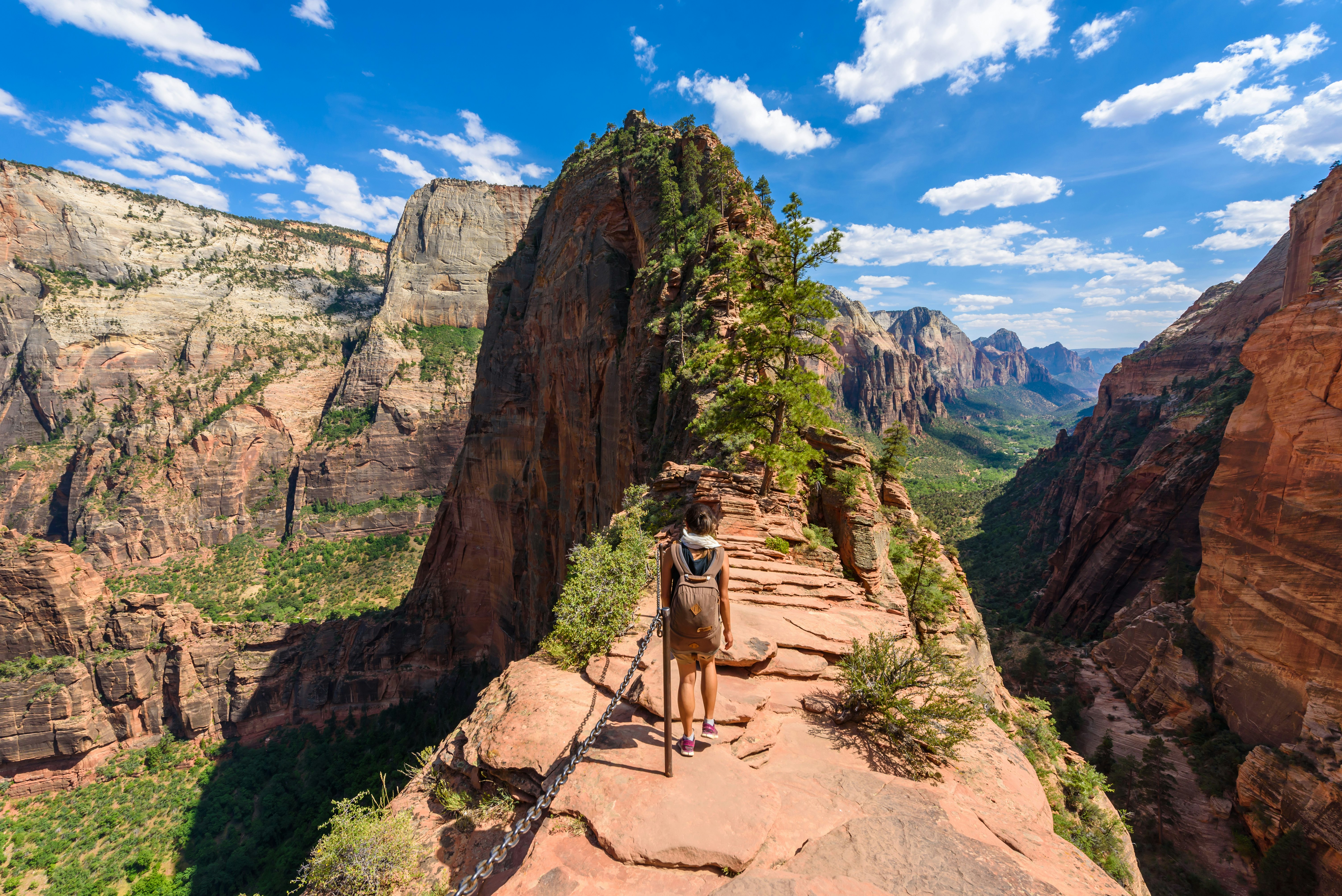
8. Zion National Park
Travel Time: 2 hours 30 minutes
Get ready for an overdose of awesome. The soaring red-and-white cliffs of Zion Canyon – one of southern Utah's most dramatic natural wonders – rise high above the Virgin River. Hiking downriver through the tight gorge known as the Narrows or gazing down from the rocky top of Angels Landing after a 1500ft ascent is simply amazing.
That's just the beginning. For all its awe-inspiring majesty, the park also shields more delicate beauty – rocks that 'weep' water, delicate grottoes, hanging gardens and mesa-top meadows of wildflowers. It's close enough to visit on a day trip from Vegas, but it's more rewarding to explore slowly, hiking the trails and staying overnight at one of the three park campgrounds or in nearby lodges and B&Bs.
How to get to Zion National Park: The drive from Vegas to Zion National Park takes around 2½ hours, mostly following Interstate 15. If you arrive via the park's South Entrance, you should expect traffic jams of 30 minutes or more just to pass the entry kiosk. Arrive well before 8am to avoid the worst of the traffic and increase your odds of getting a coveted parking spot.















